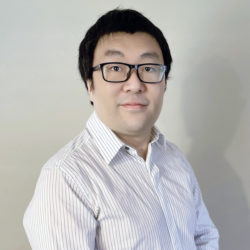By Elaine Smith
The Lassonde School of Engineering’s new, paid work-integrated learning (WIL) program, the first in Canada, celebrated the successful launch of its first cohort – co-pioneers of a future where students can advance their studies along with their careers.

In fall 2023, Eamon Ryan was one of the 17 students fortunate enough to be part of the first WIL cohort when he began working full time for BMO while taking a full course load in the Integrated Program in Digital Technologies at Lassonde. After four years of full-time work and studies, he will graduate with a bachelor of applied science in digital technologies, specializing in either cybersecurity, data analysis or software development. After earning a salary for four years, he should also have minimal debt and a resume filled with workplace accomplishments.
“The director of the program calls us pioneers,” said Ryan. “This program is pretty much everything I ever wanted when it comes to academics and work.”
Consistent with the popular maxim, it took a village to get this visionary program off the ground – not surprising, perhaps, since one of the themes of Lassonde’s Strategic Academic Plan is Building Success Through Partnerships. This WIL program grew out of Dean Jane Goodyer’s vision and encompasses partners in the corporate community, York University administration as well as Lassonde’s faculty and staff – especially those who will be teaching at the new Markham Campus and the Lassonde Educational Innovation Studio.
The program is just as new to employers as it is to the University.
“The employers’ comfort zone in Canada is with co-op terms and internships,” said Marily Molina, Lassonde’s business development manager. “They think of students as temporary; they are generally considered students first, employees second. We had to make this fit with student recruitment standards in Canada by offering employers the opportunity to hire students on a 12-month work term, which can be renewed on an annual basis. This gives employers the advantages of keeping the student in the same role or rotating them to other teams or departments based on business needs; saving them time in recruitment efforts and getting a higher return on investment in loyalty and retention.”
For faculty, the goal is to ensure that the students learn everything they would from a standard honours computer science program while balancing their work and personal commitments.

“It led us to countless hours of meetings with our colleagues at the Lassonde Education Innovation Studio,” said Professor Kostas Kontogiannis, director of the new program. “They advised us on pedagogical theories that suited this program and we combined that with our expertise to deliver the best possible result.
“These are completely new courses, because we have to keep pace with the workplace. We restructured the course sequence, their nature and how they fit together.”
The program runs year-round, with students adhering to their employer’s work calendar, although there is an 80/20 per cent split in their time, divided between work and blocks of time spent on campus. They are also allotted a half-day each week to work on course content.
The campus time is scheduled in blocks; after a three-week on-campus orientation, the students work in person with faculty for a week every month or two. While they are working, the students are also required to attend online lectures and complete assignments.
Luckily, they move through the program as a cohort, so they have support from their classmates as they study. They also each have a workplace mentor to ease their path in the working world as they adjust to being full-time employees.
“We’re building a culture where the students aren’t in competition with each other; instead, they are supporting each other within a true learning community,” said Jenny Peach-Squibb, a professional skills coach at Lassonde.
“We laid a solid foundation for them during their orientation block and they also went through employer orientation. In December, we heard from the employers that the time spent in onboarding really pays off.”
Peach-Squibb considers all the students in the program exceptional. They were first required to gain admission to Lassonde’s Digital Technologies program, before securing a job with one of the potential employers.
“I have always been a hands-on learner, so the program appealed to me,” said Ryan, who is enjoying the entire experience: the workplace, his studies and his financial independence. The program’s salaries align with the average salary for co-op students in computer science and engineering, generally $23 to $27 per hour.
“At work, my manager walked me through everything and left to let me try things myself,” said Ryan. “I’m not being micro-managed and I learn better doing the work independently, but I’m not left without supports. And, before, I was financially reliant on my parents, but now I have financial independence; I’m sharing an apartment with my brother.
“The courses created for the program are great and showcase our learning. They use standards-based grading, so it’s all about learning and mastering concepts.”

Larry Yueli Zhang, an assistant professor in the Department of Electrical & Computer Engineering and one of the nine faculty members involved in the program, calls it “an additive process.”
“Students have a set of standards to meet, and they condition their actions to meet those targets,” he said. “It gives us a much more refined picture of student progress and better data on student performance.”
Added Kontogiannis, “As they are compiling a portfolio of their work, some of it can be put toward achieving these standards and meeting learning objectives.”
If Ryan’s supervisor is a good barometer, it’s not only the students and faculty who are pleased with the way this groundbreaking program is unfolding.
“Eamon happens to be a young man who is exceeding our expectations,” said Sajal Kumar, a database security architect at BMO. “At this young age, he has demonstrated a lot of maturity, drive, interest and professionalism. In fact, I usually have to give him fewer instructions than the others in the group.
“He is still every bit as impressive as he was on day one. If he continues to keep himself so motivated, he will do very well in life.”
Molina will be connecting with both the students and the employers twice a term to get a better understanding of how the program is unfolding. The goal is to grow the program in the coming years.
“For employers, the program provides access to new talent pipelines and addresses workplace labour shortages,” said Molina. “By removing cost barriers, the Digital Technologies program is designed to increase access to education for a wider spectrum of students. It’s a win-win situation.”


